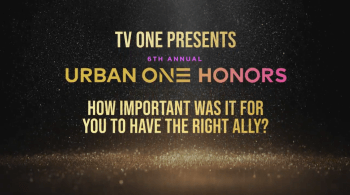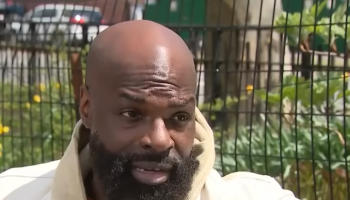It is rare to come across a rising entertainer who approaches important social causes with the same fervor they would apply to their art. Los Angeles-based Brooklyn-native Michael Cory Davis (pictured) is a shining example of a person using their influence to help the less fortunate.
SEE ALSO: Dream Defenders Score Victory: Florida Lawmakers To Review ‘Stand Your Ground’ Laws [VIDEO]
As an actor, Mr. Davis has graced both the large and small screen, starring in hit CBS soap opera “The Bold and the Beautiful.” Davis has also worked alongside Hollywood giant Tyler Perry and other productions steadily since 2000. However, Davis, in his early 20s and working on one of his first major roles, would discover that acting wasn’t the only thing he was destined for.
Hired in 2003 by the SyFy channel to act in a film called “Raptor Island” in Bulgaria, Davis got his first glimpse at the horrors of human trafficking.
“I saw these really young girls with way older men in these fancy hotels; it was indicative of what I saw in the streets back home [in New York]. I located an organization called “Face To Face Bulgaria” run by these two young women.”
The group educated Davis on the practice of sex trafficking and child exploitation, using his budding celebrity to connect his passion to learn along with advancing the organization’s mission of fighting the practice. Davis would join the organization and then go in to villages to speak with young people about the pitfalls they faced from pimps looking to exploit and throw them in to prostitution or other horrid acts.
Born to Jamaican parents who instilled in him a sense of community and the value of hard work, Davis used his experiences as an African American from the inner city to connect with the children by showing his life as an example of a person triumphing over hardship.
Davis endured a barrage of horrific stories from the young victims in his travels, but one girl’s story, Svetlana, then 13, stood out most of all.
“She had just returned to Bulgaria after living in Holland, after her adoptive parents sold her to a pimp couple,” recalled Davis. “Svetlana lived in an apartment, a brothel. [They] never allowed her to leave; she slept with 10 to 15 men per day. The couple beat her, burned her with cigarettes and more if she didn’t meet her quota. After getting pregnant, she didn’t want the couple to find out so in her eighth month, she jumped out the window and broke her arms and legs.”
Davis was overwhelmed by Svetlana’s story and returned to the States haunted by what happened to the girl. In between jobs, Davis carried the memory of Svetlana with him, but in a chance occurrence while he was working security at a nightclub, he was inspired to seek another way to assist the victims he encountered in Bulgaria.
“I was working in between jobs and working at a nightclub in Hollywood,” Davis said. “This was during the height of like Paris Hilton, sex tapes and all that. So all the girls in Bulgaria thought that was how they were going to become famous, and they [had] just gotten MTV so they were exposed to American women as sexual beings.”
Davis continued, “So within a week [of] coming back, I was at this nightclub. Three women walked and asked if they could get in. I told them they’re not on the list, but they began touching on me. It was right then it all came to me. It was no secret women came there to get next to celebrities and it dawned on me that in the United States, women don’t have to prostitute themselves, but in Bulgaria, the girls didn’t have the same opportunity.”
After telling one of the club goers to grab him some napkins and allowing them entry, Davis said he sidestepped the woman’s advances and began writing his first documentary and directorial debut, “Svetlana’s Journey.”
Returning to Bulgaria two weeks after that night, Davis contacted Face to Face with his idea, wanting desperately to tell Svetlana’s story from a filmmaker’s perspective. In six months, he was able to raise funds and get the film made, thus turning the attention of the country on the practice.
After getting the film on to Bulgarian television, corporate sponsors began to pour in dollars to Face to Face for other such initiatives and brought light to trafficking.
“Svetlana’s Journey” won the 2005 Hollywood Film Festival Best Short award and a HDFEST Deffie Award for Best HD Dramatic Film.
His passion for the cause was misunderstood by his family and friends who questioned Davis’ motives, but after winning the awards and gaining media interest, Davis began working with the FBI and the Department of Homeland Security. Turning his attention on trafficking in the States with his global focus on the issue still intact, Davis discovered that foreign nationals were being trafficked in his native country — even from as far as Bulgaria.
That discovery led to Davis learning that impoverished Latino, Caribbean, and African-American men and women were part of a larger human trafficking network. Beyond the exploited sex workers he first encountered, Davis also found that the slave labor movement was just as insidious.
After winning a $15,000 camera package as part of receiving the Deffie Award, Davis met a prominent African-American investment banker impressed by the young director’s work on “Svetlana’s Journey.” At first, Davis wanted to shoot a horror film but a trip to Houston to screen “Svetlana’s Journey” became the start of “Cargo.”
“I was in Houston screening my film and it was in front of all these congressional leaders,” Davis shared. “It was an emotional time and a woman stood up and said, ‘Thank god that’s not happening here,’ when suddenly a Hispanic girl started crying, saying, ‘It doesn’t happen here? It does happen here. I’m a victim and survivor and it happened to me here in Houston.’”
The girl speaking out started a chain reaction of revelation, as a Liberian-born woman spoke about her experiences of being trafficked and then social workers began to reveal their side of the issue. Davis realized at that moment that speaking on the domestic side of trafficking was a necessary move. With the women approaching him after the screening, Davis made them a promise to always reveal the ugly truth and stand with the victims of human trafficking.
Returning to Los Angeles, the banker gave Davis a round of funding to begin filming “Cargo” and Davis became an expert on the subject matter, working with world leaders and leading organizations. Returning to Bulgaria to finalize the film, human trafficking became the principle motivation in Davis’ life and he continued to raise funds for shelters while working tirelessly to expose the evils.
Watch “Cargo: Innocence Lost,” another award-winner, here:
Keeping true to his humble spirit, Davis says he didn’t get in to the anti-trafficking movement for profit, but he did begin to notice organizations were using his films to raise funds and do work within the movement. Instead of taking umbrage at these groups using his work and not including his input, Davis created his own non-profit, Artists United For Social Justice, in 2009 to help continue the fight.
According to Davis, trafficking happens to men, women, and children nationwide but most especially to those communities that are underserved.
Data shows that a pimp can make up to $200,000 per child a year in the States, with an average of five or six children working for them.
“Children that are abused and neglected, children that are violated by adults who don’t care for them, children who lack resources, these are some of the main victims of trafficking and they happen to be of color,” said Davis. “It’s no different than in Bulgaria. Where there’s poverty, there is someone willing to exploit poor people for selfish profit.”
Davis continued to say that because poor communities in America are disproportionately inhabited by people of color, it’s safe to assume, without hard data to back the claim, that trafficking victims come from those areas.
Davis didn’t pull any punches in saying that the Black community has turned a blind eye to the issue of trafficking and exploitation as it is customary for many to keep things “hush hush” in his words. Davis also recognizes that as a working actor, he does not fit the typical mode of the non-profit warrior. In fact, he said that people still ask him why he’s been so attached to the cause, which he labeled as “unfortunate.”
Still, Davis is determined to press with his “I Stop Traffic” campaign and is working on his third feature film, the hard-hitting “Close To Home.”
Meanwhile, Davis’ non-profit has launched an Indiegogo campaign to help with the completion of “Close To Home.” The trailer for the film (featured above), which is impactful with its stark imagery, immediately drives home how twisted traffickers are and the dangers victims endure. This effect, Davis says, is the purpose of art connecting with the viewer to get outside voices involved.
Davis has hopes that other prominent male celebrities will stand with him in the “I Stop Traffic” campaign, naming Michael Vick, Denzel Washington, and Laurence Fishburne as hopeful allies. Because traffickers tend to be overwhelmingly male — even though many women run operations as well — Davis feels that a strong male presence will show that there is solidarity between genders regardless of orientation, race, and culture.
If Davis never gets the Hollywood support, he’s already proven his worth many times over by taking on a challenge that few would — even at the pinnacle of their success. Although Davis proved to be far too humble to call himself a “hero,” he is definitely that and so much more.
Learn more about Davis’ “I Stop Traffic” campaign here and learn more about the “Close To Home” Indiegogo project here.
SEE ALSO: Harper Lee: “To Kill A Mockingbird” Author A Victim Of Elder Abuse
Actor Becomes Anti-Human Trafficking Activist was originally published on newsone.com















